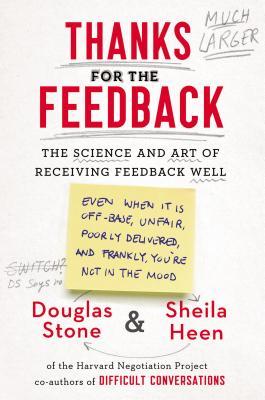Book Review: Thanks for the Feedback
Disclosure: This post contains affiliate links. If you make a purchase, we make a small commission which helps us pay our writers and fuels our caffeine addiction.
This month, I considered several books to review. I started a few that I know I want to review eventually, yet the time didn’t feel right. When multiple smutlancers in the Smutlancers’ Slack Community mentioned struggling with feedback, I knew Thanks for the Feedback was the right one for February.
 Receiving Feedback isn’t Always Easy
Receiving Feedback isn’t Always Easy
The subtitle of this book really caught my attention:
Thanks for the Feedback: The Science and Art of Receiving Feedback Well*
*even when it is off base, unfair, poorly delivered, and, frankly, you’re not in the mood.
Of course, receiving feedback can be relatively easy and even satisfying when you agree with it. “Great job!” is feedback, and that’s always great to hear. The subtitle of this book, along with making me laugh, let me know that the authors know exactly how difficult it can be to receive feedback. The subtitle promised to tell me how to take feedback even when it’s difficult, and Thanks for the Feedback definitely delivered this information-packed book.
Take Notes
Actually, if I had one critique of this book, it’s that the information is packed too deep. If you listen to this book on Audible, as I did, prepare to listen at least twice to absorb the information. Stone and Heen coined or repurposed several phrases here. While they’re relatively simple, unless you’re taking notes, you’ll probably forget their definitions in a minute or two while listening to the audiobook. Honestly, I recommend devouring this book with a pen to take notes and frequent breaks.
I quickly noticed that Thanks for the Feedback overlaps with a methodology called Nonviolent Communication (NVC). Whether that’s coincidental or intentional, I couldn’t tell. However, those familiar with NVC will find some of these messages easy to pick up. For example, chapters 3 and 4 continually emphasize that people have different data about the same situation. Stone and Heen then encourage readers to separate their judgments from their observations as much as possible. This is a very common and foundational sentiment in the NVC world. Conversely, if you enjoy Thanks for the Feedback, you might also enjoy NVC. I recommend Say What You Mean by Oren Jay Sofer as a great starting point.
Types of Feedback
The distinction between types of feedback discussed Thanks for the Feedback instantly changed how I viewed most of my relationships. Chapter 2 describes three kinds of feedback: appreciation, coaching, and evaluation.
- Appreciation is recognition for your effort put in. Empathy forms the basis of appreciation because to really appreciate how hard someone worked, you need to be able to put yourself in their shoes.
- Coaching is advice on how to get better. Coaching always has some basis in evaluation because it says, implicitly or explicitly, that you could be better.
- Evaluation tells you how to measure up. This could be either to a person or some sort of written or unwritten standard.
The major conflicts caused by feedback in my life happened when I asked for or expected one type of feedback and I received a different kind. So if I want thoughts on how to improve the language in my bio, for example, and my husband says “It’s great,” I’ve received appreciation when I needed coaching. Yes, it’s nice to be appreciated, but I want help, not recognition! This distinction has helped me receive much better feedback in my partnership, with my roommates, and with clients.
Will this help Smutlancers?
This book is a game-changer for smutlancers. When speaking with editors, it’s easier to have that conversation about what needs to change for your piece to be accepted. It’s also easier to process feedback that you disagree with (or that you agree with and find heartwrenching). Comments on your blog and Twitter replies are all also feedback, so having several models to understand them empowers you to take them well…even when it’s off base, unfair, poorly delivered, and, frankly, you’re not in the mood.

 Receiving Feedback isn’t Always Easy
Receiving Feedback isn’t Always Easy